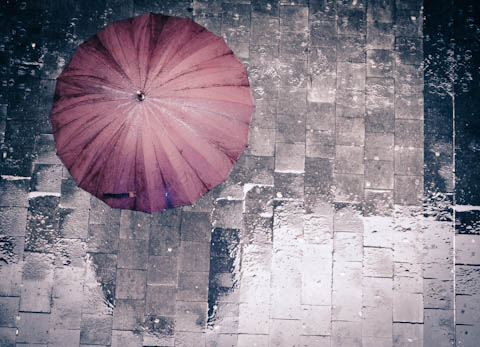
Tomas looked down from the balcony.
This house, the house he’d grown up in, was old, faded. The cool blues and sweet melons of his childhood forgotten and replaced with dry grays and dingy mustards. It was as if his mother had taken all of the color with her when she left. Papa had told them that she died. Suddenly one night when Tomas was 12 and Hugo had just turned 4.
Tomas had believed Papa and Hugo had not. And that is all you need to know about the two Claudio brothers.
This morning Tomas is 32 and Hugo 24. Papa is just eternally middle aged. Tomas thinks he is 50, Hugo thinks 47.
It is spring. Or it should be. It doesn’t seem like spring. The clouds won’t lift in the evening to let the dusk through as they ought to. There is no small break in the afternoon when the rain stops for an hour or two and the birds can sing a bit and flit around the overgrown backyard gathering the tufts of dry grass from under the overhangs where they have been sheltered from the winter rains.
Tomas is in the parlor. Waiting for Elena to come back from what ever errand she has gone off to. He never really knows why she’s gone out. He doesn’t believe that it matters to her. Only that she is able to leave his father’s house and his mother’s ghost and Magda’s peering.
Tomas is home for a rest, to recover. Over work they had said. Take some time off, then we’ll see. He had come back with Elena, his pretty, accomplished wife. They are living in his father’s house, waiting to see. Elena is perhaps making plans. Plans to return to the capital, plans to find a house here in town, plans to remain in his fathers house, with his mother’s ghost, in Magda’s place. She doesn’t say.
Magda had been his nurse and then Hugo’s nurse and then she had gone to help at cousin Estrella’s just before their mother had died. Or left if you believe Hugo’s version of the story.
Magda had come back about the time Tomas left for university, just when Papa and Hugo no longer needed any one to keep house for them. Just when Papa and Hugo would have been glad to be rid of the succession of women who had tried to make the house on Palacio Square into their house. Into something that clearly had a woman to direct it and manage it and steer it along the path to rightness.
And Magda had stayed. Stayed through Hugo finishing high school, stayed through Hugo leaving for university, stayed through Papa shutting up the rooms upstairs, stayed through the days and weeks when Papa worked and ate and slept anywhere but in the house in Palacio Square.
Stayed when Hugo came back from the capital carrying a fresh degree in engineering in his pocket and planning to join his father at Lucerne Iron Works. No one had ever understood why Papa’s grandfather had named the foundry Lucerne. It was not a secret. Merely a question met with a shrug. Who knew. Who cared. It was Lucerne and they made girders and beams and factory sheds and bridges and enough money to be happy and well fed and hold their heads up in town and to be left alone. To be left alone. Hugo and Papa just wanted to be left alone. Except that Magda didn’t want them to be alone.
And Tomas was beginning to understand that his wife didn’t want them to be left alone either.
But just this moment he was sitting on the little balcony of the upstairs parlor, looking over the square. Watching the umbrellas pass below him. Circles of black and brown and blue. Circles moving across the square. No hands, no feet, no flicks of boot, or shoes, or sandals. He is waiting for his wife’s lavender umbrella to appear below him. A perfect circle of floating color against the shining gray paving stones. And the one moment in the day when he truly thinks she is beautiful.
————

Brava.
That’s lovely. Nearly a poem, always a story.
Well turned, sharply focused, with the details around the edges finally showing us the center: what’s under the umbrella is too important simply to flash into a quick digital image.
Thanks.